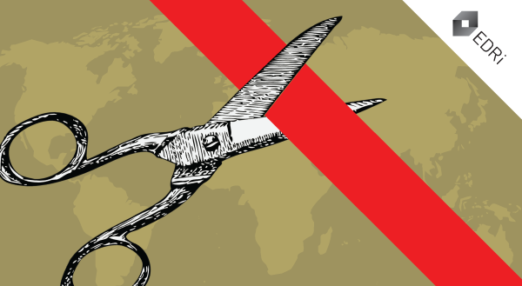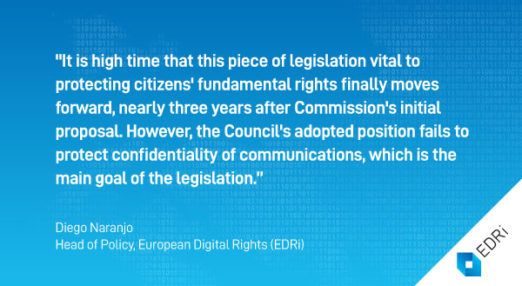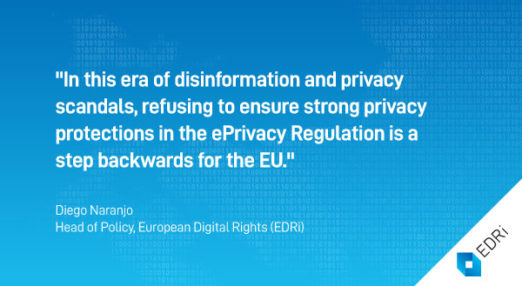Privacy and data protection
Privacy and data protection are essential for us to live, connect, work, create, organise and more. Governments and companies have long used mass surveillance for control trying to legitimise snooping for health, security or other reasons. The near-total digitisation of our lives has made it easier to control, profile and profit from our attention, data, bodies and behaviours in ways that are very difficult for us to understand and challenge. European data protection standards such as the GDPR are a good step forward but we need more to effectively ensure enforcement and protection against unlawful surveillance practices.
Filter resources
-

Why privacy is particularly crucial for people with disabilities
With data being described as the “new currency”, many questions arise around privacy and data protection. We all leave increasingly larger data footprints as we use more, and more advanced technologies. We let apps access our phonebook contacts, track our habits and behavior, and know our preferences. At other times, we do not even have […]
Read more
-

Serbia: Unlawful facial recognition video surveillance in Belgrade
On 3 December 2019, EDRi member SHARE Foundation, together with two other organisations, published a policy brief concerning a new “smart video-surveillance system” in Belgrade. The brief highlights that the impact assessment of video surveillance on human rights, conducted by the Serbian Ministry of Interior did not meet the legal requirements, and the installation of […]
Read more
-

New Protocol on cybercrime: cutting red tape ≠ cutting human rights safeguards
From 20 to 22 November 2019, European Digital Rights (EDRi) and the Electronic Frontier Foundation (EFF) took part in the Octopus Conference 2019 at the Council of Europe (CoE) to present the comments submitted by EFF, EDRi, IT-Pol Denmark and the Electronic Privacy Information Center (EPIC) on draft provisions of the Second Additional Protocol to […]
Read more
-

EU Council moves the ePrivacy reform forward – with major flaws in its position
Read more
-

ePrivacy: EU Member States push crucial reform on privacy norms close to a dead end
Today, on 22 November 2019, the Permanent Representatives Committee of the Council of the European Union (COREPER) has rejected the Council’s position on a draft ePrivacy Regulation. “In this era of disinformation and privacy scandals, refusing to ensure strong privacy protections in the ePrivacy Regulation is a step backwards for the EU,” said Diego Naranjo, […]
Read more
-

Dance. Enjoy. Share. With Care.
Anyone using cloud services should be aware of what the “cloud” is, what it is not, and how it can affect our privacy and security. Our information stored in “clouds” can be protected if the EU says “Yes!” to a strong ePrivacy Regulation, greater enforcement of the General Data Protection Regulation (GDPR), and drops the […]
Read more
-

ePrivacy hangs in the balance, but it’s not over yet…
Unless you have been living under a rock (read: outside the “Brussels bubble”) you will likely be aware of the long and winding road on which the proposed ePrivacy Regulation has been for the last three years. This is not unusual for a piece of European Union (EU) legislation – the 2018 General Data Protection […]
Read more
-

“E-evidence”: Repairing the unrepairable
On 11 November 2019, Member of the European Parliament (MEP) Birgit Sippel (S&D), Rapporteur for the Committee on Civil Liberties, Justice and Home Affairs (LIBE) presented her draft Report, attempting to fix the many flaws of the European Commission’s “e-evidence” proposal. Has Sippel MEP been successful at repairing the unrepairable? The initial e-evidence proposal by […]
Read more
-

Greece: The new data protection law raises concerns
On 29 August 2019, the much awaited new Greek data protection law came into force. Τhis law (4624/2019), implements both the provisions of the EU Law Enforcement Directive (LED, 2016/680) and the General Data Protection Regulation (GDPR) into national level. However, since the first days after the law was adopted, a lot of criticism was […]
Read more
-

Twitter banning political ads – the tip of the iceberg
Twitter seems to have learnt the lessons of the 2016 US elections. After the revelation of the Cambridge Analytica scandal, the link between the use of social media targeted political advertisement and the voting behaviour of specific groups of people has been explored and explained again and again. We now understand how social media platforms […]
Read more
-

Danish data retention: Back to normal after major crisis
The Danish police and the Ministry of Justice consider access to electronic communications data to be a crucial tool for investigation and prosecution of criminal offences. Legal requirements for blanket data retention, which originally transposed the EU Data Retention Directive, are still in place in Denmark, despite the judgments from the Court of Justice of […]
Read more
-

Austrian Passenger Name Records complaint – the key points
Austrian EDRi member epicenter.works filed a complaint with the Austrian data protection authority (DPA) about the Passenger Name Records (PNR) in August 2019, with the aim to overturn the EU PNR Directive. On 6 September, the DPA rejected the complaint, which was a good news, because that was the only way to lodge a complaint […]
Read more
